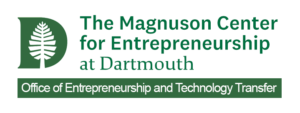Former Accelerator Team Moves Forward with Venture Capital Backing
cosMYC, a company that grew out of research supported by the Dartmouth Innovation Accelerator for Cancer, is working to identify potential new cancer drugs.

Michael D. Cole, Professor of Molecular and Systems Biology at Geisel School of Medicine, and research scientist Ed Feris have worked for years—more than four decades in Cole’s case—to identify a new way to identify cancer drugs that disrupt the MYC oncogene. Now, they’re adjusting to a new role: business leaders who remain active scientists.
Last March, Cole and Feris founded cosMYC, a company that grew out of research that was supported in part by the Dartmouth Innovation Accelerator for Cancer (DIAC). The promise of Cole’s and Feris’s research attracted the attention of a blue-chip venture capital firm, and their company was fully funded.
“Since then, things have been moving pretty quickly and in the right direction for going after MYC,” says Feris, who is now the CEO of cosMYC in addition to his research role.
The MYC oncogene, a driver of many of the most virulent cancers, has long been a prime but elusive target in cancer drug development. More than twenty years ago, the Cole lab identified MYC’s vulnerability in its dependence on a protein the Cole lab named TRRAP. First as a graduate student in the Cole lab, then as a post-doctoral fellow, and now as a research scientist, Feris has developed a novel approach to inhibiting MYC through TRRAP.
Mastering the pitch
For the two career scientists, participating in DIAC was an important introduction to the world of business and biotech entrepreneurship.
“The Accelerator was instrumental in introducing us to the art of the ‘pitch,’ for which neither Ed nor I had any experience,” says Cole, who is now Chair of the Scientific Advisory Board at cosMYC, in addition to running his lab at Geisel. “With the help of the feedback from the Accelerator advisory board, we were able to refine our presentation and successfully convey the excitement we have for our research program to an informed and discerning audience. We would have never been successful in securing venture capital funding without this prior experience.”
With a solid pitch focused on the potential real-world impact of their science, Cole and Feris were able to respond to the potential investors who approached them.
“The Accelerator was great in teaching us how to raise the capital needed to get us to the point we are now,” Feris says. “Those courses were in preparation for this moment.”
Now, there’s a new set of skills to learn.
“It would be great if Dartmouth would have an accelerator on how to run a company,” Feris jokes.
Research accelerated 10-fold
After founding cosMYC, Cole and Feris worked with the Technology Transfer Office to license intellectual property from Dartmouth. After their licensing agreement was in place, they were ready to start work under the new company. That’s when the pace of research really took off, thanks to the resources that the company can provide.
“We have access to resources that allow us to work ten times faster than we would in an academic lab,” Feris said.
“With the Accelerator award and our new venture capital funding, we have been able to engage various contract research organizations to expand our screen for MYC:TRRAP inhibitors nearly 10-fold,” Cole explained.
Focusing on patients
From the hundreds of thousands of compounds being tested, Cole and Feris hope to identify a handful of inhibitors as potential new cancer drugs. From there, they will narrow it down to the top possible drug candidates to be tested in clinical trials.
Those trials are a few years away, yet the human impact of their work drives Cole and Feris. Attracting capital and founding a company is important, they stress, but the true goal is to better the lives of people with cancer.
“The whole point of the company is to deliver what an academic lab cannot. It’s a means to an end, not the end,” Feris says. “The end is to deliver a product that can reach patients and improve clinical outcomes.”
“From the time my lab and others first identified MYC as a key driver in cancer, MYC has been considered ‘undruggable,’” Cole adds. “It is exciting to glimpse so near at hand a future in which we can indeed drug the undruggable.”
For more information, contact Bethany Solomon at bethany.solomon@hitchcock.org.

